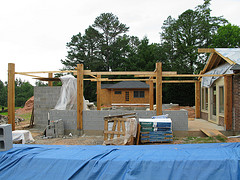8 Types of Building Materials: Going Green
 Are you planning to build, remodel, or renovate a house this year … or even just daydreaming about it? Whatever the case, then you will want to read through our list of eight types of building materials and the most environmentally friendly ways to use them. Discuss this guide with your general contractor and ask for his or her specific recommendations of types of building materials to make your new home efficient, gorgeous and green.
Are you planning to build, remodel, or renovate a house this year … or even just daydreaming about it? Whatever the case, then you will want to read through our list of eight types of building materials and the most environmentally friendly ways to use them. Discuss this guide with your general contractor and ask for his or her specific recommendations of types of building materials to make your new home efficient, gorgeous and green.
1. Concrete
What it is: a mix of cement, aggregate, and water.
Uses: Traditionally used for supports, walls, floors, and exterior structures like driveways or patios, concrete is growing very popular in home construction for such diverse purposes as countertops and fencing. It is durable and resistant to climate, pests, and natural disasters. However, its manufacture results in a high rate of greenhouse gas emissions.
Go green: Look for concrete made with recycled content or energy-efficient, non-toxic autoclaved aerated concrete (AAC).
2. Lumber
What it is: cut from softwood or hardwood trees such as pine or maple respectively, depending on the intended use in construction.
Uses: Lumber may be used as paneling, sheathing, siding, or subflooring, or for more decorative work -- trim, molding, and cabinets.
Go green: Obtain wood for building and decor from a sustainable, responsibly managed source, as certified by the Forest Stewardship Council (FSC). A current trend is the use of salvaged or reclaimed wood.
3. Brick
What it is: traditionally made from clay or mud, formed into blocks and fired, for centuries. In recent years, concrete bricks have begun to play an important role in construction.
Uses: Bricks are simply stacked or joined with the help of mortar for exterior walls, fireplaces, and paths. Interior brick walls are a trendy design element.
Go green: Because production of brick involves non-renewable resources, it is recommended to use salvaged brick when possible.
4. Stone
What it is: a natural material quarried from the earth.
Uses: Stone may be utilized for supports, flooring, walls, or outdoor hardscaping, or cut into tiles.
Go green: Although we seem to have a great deal of stone, it is actually classed as a non-renewable resource. Repurposed stone is the most environmentally friendly choice.
5. Aluminum
What it is: a lightweight metal that is surprisingly strong. It may weigh up to 65 percent less than steel equivalent in strength.
Uses: Aluminum is useful for construction support, walls, doors, window frames, roof covers, stairs, and HVAC systems.
Go green: Although the production process is energy-intensive and produces a great deal of pollution, once it has been produced, virtually 100 percent of aluminum can be recycled, over and over again.
6. Steel
What it is: made from iron, smelted, purified, and alloyed with carbon.
Uses: This strong, durable metal is used for supports and frames.
Go green: The energy-intensive steel production process creates a large amount of pollution. Find recycled steel or substitute another material.
7. Drywall
What it is: a sort of sandwich made up of heavy sheets of paper containing a layer of gypsum plaster in between.
Uses: Also known as plasterboard or gypsum board, drywall construction serves as a faster alternative to traditional lath and plaster building for interior walls, partitions, and ceilings. Many types of drywall off-gas harmful chemicals.
Go green: Request that your contractor use non-synthetic drywall boards made with natural fixative agents.
8. Glass
What it is: made up of several minerals, with silica as its main component, mixed with limestone, soda ash, and occasionally other ingredients. These are melded together using very high heat.
Uses: Glass is used for windowpanes, skylights, doors, and translucent bricks.
Go green: Glass production uses a high amount of energy and non-renewable resources. Recycled and energy-efficient glass is best.
Laura Firszt writes for networx.com.
Updated December 3, 2018.
Looking for a Pro? Call us (866) 441-6648

Remodeling Average Costs
Remodeling Contractors Experiences

Cast Iron Bathtub Replacement Was Definitely Not A DIY Project

A Great Contractor Will Guide You In Remodel Decisions That Work



